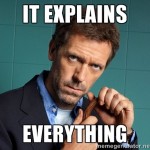This post is part 1 of a 3-part series. Previously, I posted a 3-part series about my vision of Neo paganismwhen I came to the movement. The previous series was a kind of retrospective. This series will be more forward-looking.
I have a confession to make. I have been guilty of a kind of Pagan fundamentalism. Here on this blog and on the website I maintained (AmericanNeopaganism.com) for the last several years, I have tried to define Paganism in a way that privileged my own beliefs and practices. I have imagined myself somehow at the center of the “Pagan umbrella”. I have presumed that my beliefs and my practices represented a pure “core” of Paganism. This is particularly embarrassing to admit in a community that places a high value on diversity and tends to eschew dogmatism. If there were a Pagan Ten Commandments, I’m pretty sure my attitude would have broken at least one of them.
This fundamentalist attitude may have been a vestige of my upbringing in a Christian tradition that insisted it was the “one and only” true way. While acknowledging that other churches have some truth, Mormons claim that only their church has the “fullness of the gospel”. I remember, a few months after I left the Mormon church, my wife pointed out to me that my dogmatic attitudes had not changed since leaving the church: when I was Mormon, I was dogmatically Mormon; when I left the church, I was dogmatically anti-Mormon. I hope that I have evolved somewhat since then, but then I realized that I still have a tendency toward dogmatism, even in my Paganism.
Shutting down the AmericanNeopaganism website (and the project that that site represented) has, I think, freed me up to take a new look at the Pagan community and my own place within it. Previously, I imagined circle of “pure” Neopaganism that was “infected” by the overlapping influences of esotericism and deity-centered Paganism. I imagined that it was possible, by conceptually removing these influences to get at a “core” Paganism — of which, of course, I was representative.
Gradually, I have come to realize the ego-centrism of this whole project and recognize how my “core” Paganism inevitably mirrored my own personal brand of Paganism. This insight allowed me to entertain the possibility that my own Paganism is not — not even conceptually — centrist, as well as the possibility that there is no conceptual “center” of Paganism. What if there is no one center? What if there are multiple centers? And what if my own Paganism is not even representative of any of these centers, but is just another hybrid of multiple centers?
In the next part of this series, I will discuss my new conception of the Pagan community. In the last part, I will discuss where I think I fit within that community.











